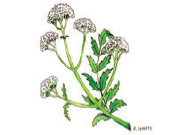The use of dietary supplements by patients with cancer has increased significantly over the past 20 years despite insufficient evidence of safety and effectiveness. Finding reliable sources of information about dietary supplements can be daunting. Patients typically rely on family, friends, and the Internet, often receiving misleading information.
The ASCO Post’s Integrative Oncology series is intended to facilitate the availability of evidence-based information on integrative and complementary therapies commonly used by patients with cancer. We chose valerian for this issue because of its continued popularity as a sleep aid.
Compiled by Barrie R. Cassileth, PhD, and Jyothirmai Gubili, MS, of Memorial Sloan Kettering Cancer Center. The free About Herbs website is managed by K. Simon Yeung, PharmD, MBA, LAc, of Memorial Sloan Kettering Cancer Center.
Scientific Names: Valeriana officinalis, Valeriana radix
Common Names: Garden valerian, Indian valerian, Pacific valerian, garden heliotrope
Overview
A perennial flowering plant prevalent in Europe, Asia, and North America, valerian has a long medicinal history as a relaxant. Its potential as a remedy for insomnia was first described by Hippocrates.

Jyothirmai Gubili, MS
Valerian continues to be used today to treat nervousness, trembling, headaches, and sleeplessness. It is also employed in treating epilepsy, gastrointestinal spasms, and attention deficit hyperactivity disorder.
Clinical evidence of valerian’s effectiveness as an anxiolytic is mixed. Definitive data are needed to establish its therapeutic value.
Over the past few decades, valerian has gained immense popularity around the world as an anxiety reliever and as a sleep aid. Powdered valerian root is sold in the form of capsules, tablets, and teas, whereas the fluid extracts and tinctures are marketed in both alcohol and alcohol-free bases.
The Science
Preclinical studies have showed that valerian exerts antioxidant,1 cytoprotective,2 neuroprotective,3 antispasmodic,4 anxiolytic,5 and antidepressant6 effects.
Clinical data indicate modest effects of valerian on improving sleep quality,7-9 but its sleep-inducing properties were not superior to placebo.10,11 Valerian also failed to improve sleep in a study of patients with cancer.12 Whether it acts as an anxiolytic remains inconclusive as well due to lack of substantial data.13
In other studies, valerian was shown to be effective in reducing hot flashes,14 treating symptoms of dysmenorrhea15 and obsessive compulsive disorder,16 and facilitating benzodiazepine withdrawal.17
Constituents extracted from valerian exert anticancer effects both in vitro and in vivo.18,19 However, clinical trials have yet to be conducted to determine its anticancer potential.
Adverse Reactions
Valerian may cause headache, diarrhea and other gastrointestinal complaints, daytime sedation/dullness, impaired alertness, depression, irritability, dizziness, sweating, heart palpitations, bitter taste, and benzodiazepine-like withdrawal symptoms with supplement cessation.8,12,20,21
Case Reports
Hepatotoxicity has been reported following the use of valerian products, with symptom resolution after its discontinuation.22,23
Valerian was identified as a potential contributor to cases of idiopathic acute pancreatitis.24
In pregnant mice, administration of valerian significantly reduced zinc levels in the fetal brain.25
Contraindications
Patients with liver or pancreatic disease should avoid valerian, as it can cause hepatotoxicity23 and pancreatitis.24
Patients should not drive or operate machinery when taking valerian, as it can disrupt information processing and task performance 1 to 2 hours following its intake.20
Individuals who are pregnant or nursing should avoid valerian, as it has not adequately been studied in these populations. Animal models suggest it can adversely affect fetal brain development.5
Herb-Drug Interactions
Barbiturates: Valerian has been shown to prolong pentobarbital-induced sleep.26
Benzodiazepines: Valerian may have synergistic effects.27
Haloperidol: Valerian may have an additive effect resulting in hepatic damage.28
Cytochrome P450 (CYP450) substrates: Valerian inhibits CYP2D629 and CYP3A430,31 and may affect the serum concentration of drugs metabolized by these enzymes.
P-glycoprotein substrates: Valerian inhibits P-glycoprotein transporters and can increase the intracellular concentration of substrate drugs.31
Uridine 5´-diphospho-glucuronosyltransferase (UGT) substrates: Valerian modulates UGT enzymes in vitro and can increase the side effects of drugs metabolized by them.32 ■
Disclosure: Ms. Gubili reported no potential conflicts of interest.
References
1. Sudati JH, Fachinetto R, Pereira RP, et al: In vitro antioxidant activity of Valeriana officinalis against different neurotoxic agents. Neurochem Res 34:1372-1379, 2009.
2. de Oliveira DM, Barreto G, De Andrade DV, et al: Cytoprotective effect of Valeriana officinalis extract on an in vitro experimental model of Parkinson disease. Neurochem Res 34:215-220, 2009.
3. Xu J, Guo Y, Xie C, et al: Isolation and neuroprotective activities of acylated iridoids from Valeriana jatamansi. Chem Biodivers 9:1382-1388, 2012.
4. Gilani AH, Khan AU, Jabeen Q, et al: Antispasmodic and blood pressure lowering effects of Valeriana wallichii are mediated through K+ channel activation. J Ethnopharmacol 100:347-352, 2005.
5. Murphy K, Kubin ZJ, Shepherd JN, et al: Valeriana officinalis root extracts have potent anxiolytic effects in laboratory rats. Phytomedicine 17:674-678, 2010.
6. Liu XG, Gao PY, Wang GS, et al: In vivo antidepressant activity of sesquiterpenes from the roots of Valeriana fauriei Briq. Fitoterapia 83:599-603, 2012.
7. Bent S, Padula A, Moore D, et al: Valerian for sleep: A systematic review and meta-analysis. Am J Med 119:1005-1012, 2006.
8. Fernández-San-Martin MI, Masa-Font R, Palacios-Soler L, et al: Effectiveness of Valerian on insomnia: A meta-analysis of randomized placebo-controlled trials. Sleep Med 11:505-511, 2010.
9. Taavoni S, Ekbatani N, Kashaniyan M, et al: Effect of valerian on sleep quality in postmenopausal women: A randomized placebo-controlled clinical trial. Menopause 18:951-955, 2011.
10. Oxman AD, Flottorp S, Hâvelsrud K, et al: A televised, web-based randomised trial of an herbal remedy (valerian) for insomnia. PLoS One 2:e1040, 2007.
11. Taibi DM, Vitiello MV, Barsness S, et al: A randomized clinical trial of valerian fails to improve self-reported, polysomnographic, and actigraphic sleep in older women with insomnia. Sleep Med 10:319-328, 2009.
12. Barton DL, Atherton PJ, Bauer BA, et al: The use of Valeriana officinalis (Valerian) in improving sleep in patients who are undergoing treatment for cancer: A phase III randomized, placebo-controlled, double-blind study (NCCTG Trial, N01C5). J Support Oncol 9:24-31, 2011.
13. Sarris J, McIntyre E, Camfield DA: Plant-based medicines for anxiety disorders, part 2: A review of clinical studies with supporting preclinical evidence. CNS Drugs 27:301-319, 2013.
14. Mirabi P, Mojab F: The effects of valerian root on hot flashes in menopausal women. Iran J Pharm Res 12:217-222, 2013.
15. Mirabi P, Dolatian M, Mojab F, et al: Effects of valerian on the severity and systemic manifestations of dysmenorrhea. Int J Gynaecol Obstet 115:285-288, 2011.
16. Pakseresht S, Boostani H, Sayyah M: Extract of valerian root (Valeriana officinalis L.) vs. placebo in treatment of obsessive-compulsive disorder: A randomized double-blind study. J Complement Integr Med 8:1, 2011.
17. Lopez-Peig C, Mundet X, Casabella B, et al: Analysis of benzodiazepine withdrawal program managed by primary care nurses in Spain. BMC Res Notes 5:684, 2012.
18. Li X, Chen T, Lin S, et al: Valeriana jatamansi constituent IVHD-valtrate as a novel therapeutic agent to human ovarian cancer: In vitro and in vivo activities and mechanisms. Curr Cancer Drug Targets 13:472-483, 2013.
19. Lin S, Zhang ZX, Chen T, et al: Characterization of chlorinated valepotriates from Valeriana jatamansi. Phytochemistry 85:185-193, 2013.
20. Kennedy DO, Wightman EL: Herbal extracts and phytochemicals: Plant secondary metabolites and the enhancement of human brain function. Adv Nutr 2:32-50, 2011.
21. Taibi DM, Landis CA, Petry H, et al: A systematic review of valerian as a sleep aid: Safe but not effective. Sleep Med Rev 11:209-230, 2007.
22. Cohen DL, Del Toro Y: A case of valerian-associated hepatotoxicity. J Clin Gastroenterol 42:961-962, 2008.
23. Vassiliadis T, Anagnostis P, Patsiaoura K, et al: Valeriana hepatotoxicity. Sleep Med 10:935, 2009.
24. Douros A, Bronder E, Andersohn F, et al: Drug-induced acute pancreatitis: Results from the hospital-based Berlin case-control surveillance study of 102 cases. Aliment Pharmacol Ther 38:825-834, 2013.
25. Mahmoudian A, Rajaei Z, Haghir H, et al: Effects of valerian consumption during pregnancy on cortical volume and the levels of zinc and copper in the brain tissue of mouse fetus. Zhong Xi Yi Jie He Xue Bao 10:424-429, 2012.
26. Komori T, Matsumoto T, Motomura E, et al: The sleep-enhancing effect of valerian inhalation and sleep-shortening effect of lemon inhalation. Chem Senses 31:731-737, 2006.
27. Bhatt C, Kanaki N, Nayak R, et al: Synergistic potentiation of anti-anxiety activity of valerian and alprazolam by liquorice. Indian J Pharmacol 45:202-203, 2013.
28. Dalla Corte CL, Fachinetto R, Colle D, et al: Potentially adverse interactions between haloperidol and valerian. Food Chem Toxicol 46:2369-2375, 2008.
29. Hellum BH, Nilsen OG: The in vitro inhibitory potential of trade herbal products on human CYP2D6-mediated metabolism and the influence of ethanol. Basic Clin Pharmacol Toxicol 101:350-358, 2007.
30. Mooiman KD, Maas-Bakker RF, Hendrikx JJ, et al: The effect of complementary and alternative medicines on CYP3A4-mediated metabolism of three different substrates: 7-benzyloxy-4-trifluoromethyl-coumarin, midazolam and docetaxel. J Pharm Pharmacol 66:865-874, 2014.
31. Hellum BH, Nilsen OG: In vitro inhibition of CYP3A4 metabolism and P-glycoprotein-mediated transport by trade herbal products. Basic Clin Pharmacol Toxicol 102:466-475, 2008.
32. Mohamed ME, Frye RF: Effects of herbal supplements on drug glucuronidation: Review of clinical, animal, and in vitro studies. Planta Med 77:311-321, 2011.



